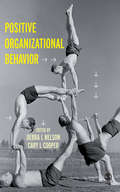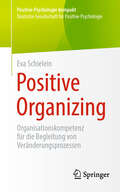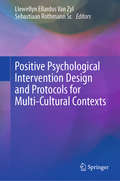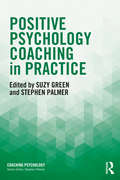- Table View
- List View
Positive Organizational Behavior
by Cary L. Cooper Debra NelsonPositive Organizational Behaviour is emerging as a truly contemporary movement within the classic discipline of organizational behaviour. The best work of leading scholars is gathered together in one edited collection. Chapters study the states, traits and processes that compromise this exciting new science. In addition to mapping the field, this collection goes one step further and invites noted experts to identify the methodological challenges facing scholars of Positive Organizational Behaviour. Positive Organizational Behaviour constitutes the study of positive human strengths and competencies, how it can be facilitated, assessed and managed to improve performace in the workplace . Its roots are firmly within positive psychology but transplanted to the world of work and organizations. This book showcases the cutting edge of this an exciting and challenging new area within Organizational Behaviour. It should be read by anyone who is interested in extending their knowledge of this field. Debra Nelson has a website at http:/www.nelsonquickgroup.com
Positive Organizational Behaviour: A Reflective Approach
by Stewart Clegg Miguel Pina Cunha Arménio Rego Ace SimpsonPositive Organizational Behaviour: A Reflective Approach introduces the most recent theoretical and empirical insights on positive organizational practices, addressing emerging topics such as resilience, job crafting, responsible leadership and mindfulness. Other books on positive approaches tend to gloss over the limitations of the positive agenda, but this textbook is unique in taking a reflective approach, focussing on the positive while also accommodating critical perspectives relating to power and control. Positive Organizational Behaviour provides an integrated conceptual framework, evidence-based findings and practical tools to gain an understanding of the potential of positive organizational practices. This innovative new textbook will provide advanced management and psychology students with a grounding in the area, and help them develop strategies for building effective and responsible organizations.
Positive Organizational Scholarship: Foundations of a New Discipline
by Kim S. Cameron Jane E. Dutton Robert E. QuinnGratitude and other positive emotions are not generally discussed in regard to organizations. Based on the first conference in this new field held at the U. of Michigan, with which Cameron (organizational behavior and human resource management) is affiliated, contributors to 23 chapters describe empirical and theoretical facets of this emerging discipline focusing on individual and management strengths driving exceptional performance.
Positive Organizing: Organisationskompetenz für die Begleitung von Veränderungsprozessen (Positive Psychologie kompakt)
by Eva SchieleinVermittelt Ihnen Grundkenntnisse der systemischen Organisationstheorie für eine wirksame Begleitung von organisationalen Veränderungsprozessen. Mit Konzepten, die auf Menschen und ihre Psychodynamiken fokussieren, kommt man bei der Arbeit mit Organisationen nicht weit. Statt über die Grenzen der Positiven Psychologie zu lamentieren, verknüpft dieses Buch den potenzialorientierten Ansatz des Positive Organizational Scholarship (POS) mit Grundlagen der systemischen Organisationstheorie, um Transformationen in Organisationen wirksam zu begleiten. Während sich mit ‚Positive Leadership‘ bereits vor Jahren ein radikal neues Verständnis von Führung etabliert hat, definiert ‚Positive Organizing‘ den Prozess des Organisierens neu. Positive Organizing wird als Prozessmodell vorgestellt, das Berater:innen und Führungskräfte einsetzen können, um Organisationen in ihrer Fähigkeit zu stärken, selbstorganisiert und potenzialorientiert Veränderungen zu bewirken. Zu den Zielgruppen: Führungskräfte, Berater:innen, Coaches, und alle, die Veränderungen in Organisationen begleiten.
Positive Prospects: Careers for social science graduates and why number and data skills matter
by Campaign for Social ScienceAlmost four in ten graduates studied one of the social sciences. Where do they go to work? How do their employment and earnings compare to those who graduate from other areas? What makes a difference to their employment chances? Positive Prospects provides a brief description of employment after graduation for those who study a wide range of social science subjects, using up-to-date information. The report gathers evidence from many sources about longer-term prospects and the backgrounds of ‘world leaders’. It shows that there is variation between those graduating from different social science disciplines, as there is with so-called STEM (science, technology, engineering and maths) graduates. Positive Prospects takes a look at the effect of graduating from different types of university, while observing that this reflects a great many factors such as students’ backgrounds and where they live and study. One clear theme is that having number and data skills – either from secondary school or as part of undergraduate study – is likely to give individuals of every discipline a wider range of choices about work, meaning they are likely to earn more. Needless to say number and data skills are not the only things that matter, nor do all social science students need the same skill level. But the Campaign for Social Science has long believed that we need more people with conceptual social science skills and knowledge combined with some number and data skills – Positive Prospects shows that this combination has clear benefits. The Campaign has also prepared summaries aimed specifically at undergraduates, schools, and school students.
Positive Psychological Approaches to Disaster: Meaning, Resilience, and Posttraumatic Growth
by Stefan E. SchulenbergWritten by prominent proponents of disaster mental health and/or positive psychology, this comprehensive book examines disaster mental health and positive psychology in the context of natural and technological disasters. Chapters in the first section focus on applications of meaning and resilience in the area of disaster mental health, both serving as primary examples of applications of positive psychology and related frameworks. Later chapters focus more specifically on key aspects of disaster mental health, including the importance of preparedness, training, and special populations. Contributors consistently align their insights with positive psychological approaches, either by explicitly referencing their relevance or alluding less directly to themes in positive psychology.Among the topics discussed:The role of religion and spirituality in finding meaning after disastersVeterans and disaster response workFirefighters: an occupational case study of resilienceStrategies for responding to adolescents following natural and technological disastersEffective crisis response for facilitating posttraumatic growthPositive Psychological Approaches to Disaster: Meaning, Resilience, and Posttraumatic Growth is a significant and timely collection of research, representing an effort of internationally respected scholars in positive psychology and disaster mental health.
Positive Psychological Intervention Design and Protocols for Multi-Cultural Contexts
by Llewellyn Ellardus Van Zyl Sebastiaan RothmannThis volume presents innovative and contemporary methodologies and intervention protocols for the enhancement of positive psychological attributes in multicultural professional and organizational contexts. Most methods, models and approaches that underpin positive psychological interventions are confined to clinical samples, closed systems or monocultural contexts, which restrict their applicability to particular contexts. Extensive practical intervention protocols, designs and methods which usually accompany first draft intervention papers are condensed into brief paragraphs in final manuscripts or removed in their entirety. This, in turn, reduces their potential for replicability or adoption by consumers, practitioners, or industry. This volume develops guidelines for enhancing positive psychological attributes, such as positive moods (e.g. positive affect; life satisfaction), strengths (e.g. gratitude; humour), cognitions (e.g. hope; optimism) and behaviours (e.g. emotional regulation; positive relationship building) within various multicultural contexts. Thereby, it shows how positive psychology interventions can be replicated to a wide-range of contexts beyond those in which they were developed.
Positive Psychologie - Erfolgsgarant oder Schönmalerei?
by Michael TomoffPositive Psychologie - Erfolgsgarant oder Schönmalerei? Entdecken Sie die Doppelkante der Positiven Psychologie: Ein Schlüssel zu mehr persönlichem und beruflichem Erfolg oder doch nur eine rosarote Brille? Diplom-Psychologe Michael Tomoff entführt Sie in eine Welt, die sowohl die glänzenden als auch die schattigen Seiten dieser bewegenden Wissenschaft beleuchtet. Das vorliegende Buch ist weit mehr als ein Glücksratgeber. Es ist eine fundierte, kritische und dennoch humorvolle Untersuchung der Positiven Psychologie, die sich sowohl an Lehrer, Eltern, Führungskräfte, Mitarbeiter, Coaches und auch Trainer richtet – egal ob Laien oder Experten. Mit einem klaren Blick auf die wissenschaftliche Basis und die praktische Anwendung beleuchtet der Autor die Mythen und Missverständnisse rund um die Wissenschaft des Wohlbefindens: Macht Geld glücklich? Sind Eltern zufriedener als Kinderlose? Welche Rolle spielen Schuld und Scham bei der Kindererziehung? Wie kann die Positive Psychologie die Schule oder das Unternehmen von morgen unterstützen und formen? Und sollte sie das überhaupt? Durch die elegante, mundgerechte Zusammenfassung aktueller Forschungen, die Vorstellung leicht umsetzbarer Übungen, Tools und Interventionen sowie die Erörterung der Relevanz der Positiven Psychologie in verschiedenen Kulturen und Lebensbereichen bietet dieses Buch einen umfassenden Überblick und praktische Anleitungen. Erfahren Sie, wie die Positive Psychologie in Schulen, Unternehmen und im persönlichen Leben konkret Anwendung finden kann, und welche Vorteile sie bietet. Michael Tomoff ist nicht nur ein erfahrener Psychologe, sondern auch ein leidenschaftlicher Botschafter für das Potenzial der Positiven Psychologie, das Wohlstand und Wohlbefinden zu fördern und dabei realistisch und kritisch zu bleiben. Mit seiner Ausbildung an der University of California in Berkeley und seiner breiten Erfahrung als Trainer, Berater und systemischer Coach bringt ereine einzigartige Perspektive und eine Fülle von praktischen Einsichten in dieses fesselnde Werk ein. In seinem Blog „Was Wäre Wenn“ gibt er wichtige Impulse zu einer Vielzahl von Themen wie Dankbarkeit, Komplimenten, dem Nein-Sagen, Grenzensetzen oder auch stärkenfokussierter Führung.
Positive Psychologie in Bildungseinrichtungen: Konzepte und Strategien für Fach- und Führungskräfte (essentials)
by Michaela BrohmMichaela Brohm stellt Konzepte und Strategien zur positiven Energetisierung von Individuen und Organisationen im Bildungsbereich vor. Sie zeigt, wie sich das energetische Niveau einer Bildungsorganisation durch positiv-psychologische Maßnahmen heben lässt, und gibt Impulse für einen motivierenden, Mensch und Organisation belebenden Führungsstil. Wertvolle Anregungen, inspirierende Beispiele und ein umfassendes Inventar zu den zentralen Elementen positiven Führungsverhaltens fordern zum Transfer in die Praxis heraus.
Positive Psychologie in Unternehmen: Für Führungskräfte (Essentials)
by Michael TomoffMichael Tomoff präsentiert einen Überblick über die Möglichkeiten, die der neue Wissenschaftszweig der Positiven Psychologie Unternehmen bietet. Der Autor unterstützt auch in der zweiten Auflage dieses mittlerweile zum Bestseller gewordenen Buches Führungskräfte dabei, ihre Arbeit sinnvoll zu bereichern, indem sie sowohl eigene als auch fremde Potenziale entdecken und entfalten. Damit können sie einen Mehrwert für sich, ihre Mitarbeiter und ihre Organisation schaffen.
Positive Psychologie in Unternehmen: Für Führungskräfte (essentials)
by Michael TomoffMichael Tomoff präsentiert einen Überblick über die Möglichkeiten, die der neue Wissenschaftszweig der Positiven Psychologie Unternehmen bietet. Der Autor unterstützt Führungskräfte dabei, ihre Arbeit sinnvoll zu bereichern, indem sie sowohl eigene als auch fremde Potenziale entdecken und entfalten. Damit können sie einen Mehrwert für sich, ihre Mitarbeiter und ihre Organisation schaffen.
Positive Psychologie und Führung – ein Praxisleitfaden (Positive Psychologie kompakt)
by Wolfhart PentzUnsere Erkenntnisse über gute Führung wachsen ständig. Spannende Einsichten aus der positiven Psychologie, aber auch aus der Hirnforschung, der Verhaltensökonomie oder der Gesundheitsforschung haben unseren Wissenskanon in den letzten Jahren dramatisch erweitert. Doch Wissenschaft ist nicht immer leicht verdaubar und selten direkt anwendbar. Dieses Buch schlägt eine Brücke zwischen den theoretischen Erkenntnissen der Wissenschaften und den praktischen Herausforderungen im Führungsalltag. Seine langjährigen Erfahrungen aus der Arbeit mit Führungskräften verbindet der Autor mit einer tiefen Wissenschaftsverbundenheit. Ausgehend von wichtigen Führungsaufgaben (z. B. wirksam kommunizieren, Ziele erreichen, Mitarbeiter entwickeln) sondiert er neueste Forschungsergebnisse und bringt sie verständlich auf den Punkt. Konkrete Handlungsempfehlungen sowie detaillierte Beschreibungen von praktischen Werkzeugen erleichtern den Lesenden die Anwendung.
Positive Psychologie, Kompetenzförderung und Mentale Stärke: Gesundheit, Motivation und Leistung fördern
by Ottmar L. BraunDieses Buch veranschaulicht Personalentwicklungsmaßnahmen zur Förderung von Selbstkompetenzen, Sozialkompetenzen, Methodenkompetenzen und mentaler Stärke im Rahmen der Positiven Psychologie. Im Mittelpunkt steht das Modell des Positiven Selbstmanagements mit folgenden drei großen Komponenten: Methoden und Techniken der Positiven Psychologie und Kompetenzen wie finanzielle Selbstmanagementkompetenz, Entscheidungskompetenz, Resilienztechniken, Vitalität, Kompetenzen in Smalltalk und Networking, Präsentationskompetenz, die Reduzierung dysfunktionaler Kognitionen, Problemlösekompetenz und Zielklarheit führen zur mentalen Stärke.Mentale Stärke: Diese setzt sich aus Selbstwirksamkeitserwartungen, Optimismus, Hoffnung, Resilienz, Selbstvertrauen und der Fähigkeit zur Emotionsregulation zusammen. Die mentale Stärke hat langfristig positive Folgen, u.a. gehören dazu Arbeitszufriedenheit, Lebenszufriedenheit, psychische Gesundheit, ein geringeres Stresserleben und eine geringere Tendenz zum Burnout. Basierend auf zahlreichen empirischen Studien , die das Modell belegen und die Wirksamkeit von Trainingsveranstaltungen bestätigen, erhält jeder Leser wertvolle Hinweise für das Arbeitsleben – auch bezüglich der Anwendung des Quizbrettspiels "CareerGames - spielend trainieren", das in den Trainings zur Transfersicherung zum Einsatz kam. Zielgruppen: Personalverantwortliche, Trainer, Anwender und Studierende bzw. alle diejenigen, die Selbstmanagementkompetenzen, Sozial- und Methodenkompetenzen und Mentale Stärke in Organisationen erfolgreich trainieren wollen. Zum Herausgeber: Prof. Dr. Ottmar L. Braun, Studium der Psychologie und Promotion zum Dr. phil. an der Universität Bielefeld. Derzeit Professor im Arbeitsbereich Sozial-, Umwelt und Wirtschaftspsychologie an der Universität Koblenz-Landau.
Positive Psychologie: Gesundheit, Motivation und Leistung fördern
by Ottmar L. Braun Sandra MihailovićDieses Buch veranschaulicht die Durchführung von Seminaren und Trainings im digitalen Online-Format zur Förderung von Mentaler Stärke, Selbstkompetenzen, Sozialkompetenzen und Methodenkompetenzen im Rahmen der Positiven Psychologie. Im Mittelpunkt steht das Modell des Positiven Selbstmanagements mit folgenden drei großen Komponenten: Methoden und Techniken der Positiven Psychologie und Kompetenzen wie Zeit- und Energiemanagement, Ziele und Motivation, Vitalität, Small-Talk und Networking, Teamfähigkeit, Gesprächsführung und wertschätzende Kommunikation, Konfliktmanagement, Planungstechniken, Selbst-PR und Problemlösekompetenz führen zur mentalen Stärke.Mentale Stärke: Diese setzt sich aus Selbstwirksamkeitserwartungen, Optimismus, Hoffnung, Resilienz, Selbstvertrauen und der Fähigkeit zur Emotionsregulation zusammen.Die mentale Stärke hat langfristig positive Folgen, u.a. gehören dazu Arbeitsfähigkeit, Lebenszufriedenheit, Glück, Aufblühen und ein geringeres Stresserleben. Basierend auf zahlreichen empirischen Studien, die das Modell belegen und die Wirksamkeit der Interventionen bestätigen, erhält jeder Leser wertvolle Hinweise für das Arbeitsleben und zur praktischen Durchführung von digitalen online-Trainingsveranstaltungen. Zielgruppen: Personalverantwortliche, Trainer, Anwender und Studierende bzw. alle diejenigen, die Selbstmanagementkompetenzen, Sozial- und Methodenkompetenzen und Mentale Stärke in Organisationen erfolgreich trainieren wollen. Herausgeber: Prof. Dr. Ottmar L. Braun, Studium der Psychologie und Promotion zum Dr. phil. an der Universität Bielefeld. Derzeit Professor im Arbeitsbereich Sozial-, Umwelt und Wirtschaftspsychologie an der Universität Koblenz-Landau, Campus Landau. Geschäftsführer der CareerGames GbR. Dipl.-Psych. Sandra Mihailović, Studium der Psychologie, langjährige Tätigkeit in einem Automobilkonzern in der Organisations- und Führungskräfteentwicklung. Derzeit selbständige Trainerin, Beraterin und Coach, Expertin für online-Trainings und Mentale Stärke. Geschäftsführerin der CareerGames GbR.
Positive Psychology Coaching
by Susanne KnowlesThis book provides evidence for coaching from psychology perspectives, aiming to inform academics, researchers and students of the efficacy of positive psychology coaching practice for both individuals and organizations. It integrates three areas of research, providing a multifaceted analysis of coaching from traditional psychology, positive psychology, and coaching research findings. Finally, it introduces a comprehensive new model of coaching (COACH) based on the psychological and educational foundations of coaching, explaining its effectiveness and adaptability across settings and individuals.
Positive Psychology Coaching in Practice (Coaching Psychology)
by Stephen Palmer Suzy GreenPositive Psychology Coaching in Practice provides a comprehensive overview of positive psychology coaching, bringing together the best of science and practice, highlighting current research, and emphasising the applicability of each element to coaching. With an international range of contributors, this book is a unique resource for those seeking to integrate positive psychology into their evidence-based coaching practice. Beginning with an overview of positive psychology coaching, the book includes an assessment of theories of wellbeing, an examination of mindfulness research, a guide to relevant neuroscience, and a review of a strengths-based approach. It also contains chapters which explore the application of ACT, the role of positive psychology in wellness and resilience coaching, positive leadership theory, and developmental psychological theories as they relate to coaching through significant life transitions. In each chapter, theory and research is thoroughly explored and applied directly to coaching practice, and supported with a list of relevant resources and a case study. The book concludes with the editors’ views on the future directions of positive psychology coaching. Positive Psychology Coaching in Practice will be essential reading for professional coaches in practice and in training seeking to enhance their evidence-based practice, coaching psychologists, practitioners of positive psychology, and academics and students of coaching, coaching psychology and positive psychology.
Positive Psychology Coaching in the Workplace
by Suzy Green Ilona Boniwell Wendy-Ann SmithThis research-to-practice text explores how coaching can support thriving in the workplace. It focuses on positive psychology coaching in the workplace in relation to: the convergence with organisational psychology and coaching psychology, professional and ethical practices, resilience and wellbeing, team and systemic approaches, leadership, tools of intervention, convergence of clinical interventions and virtuousness, and the future of thriving workplaces. The chapter contributions represent a truly international scholarship and bring together complementary perspectives from the fields of positive psychology, coaching psychology, organisational psychology, organisational scholarship, neuroscience, education and philosophy. Written in a scholarly but accessible style, this text is of interest to a wide readership, including academics, professionals and postgraduate students of positive psychology, organisational psychology, counselling and coaching psychology, human resource management, mental health, health and social welfare. "Smith, Boniwell and Green have brought together an outstanding collection of thought leaders from the field of positive psychology coaching to craft an in-depth exploration of the contribution positive psychology can make to delivering transformation change through coaching conversations. A fascinating read, full of evidence and insight". Jonathan Passmore Professor of Coaching & Behavioural Change Director Henley Centre for Coaching, Henley Business School
Positive Psychology Perspectives on Foreign Language Learning and Teaching
by Danuta Gabryś-Barker Dagmara GałajdaThis book introduces readers to the principles of a fairlynew branch of psychology - positive psychology - and demonstrates how they canbe applied in the context of second language acquisition in a naturalenvironment and in instructed foreign language (FL) learning. It focuses bothon the well-being and success of the learner and the professional and personalwell-being of the teacher. Further, the book stresses the importance of thepositive emotions and character strengths of those involved in the process oflanguage learning and teaching, as well as the significant role played byenabling institutions such as school and, at the micro-level, individual FLclasses.
Positive Psychology as Social Change
by Robert Biswas-DienerIn recent times there has been growing interest in positive psychology as evidenced by the swell in positive psychology graduate programs, undergraduate courses, journals related to the topic, popular book titles on the topic and scholarly publications. Within the positive psychology community there has been an increased emphasis on the socially beneficial side of positive psychological science. At the First World Congress of the International Positive Psychology Association there was a major push to look at positive psychology as a social change mechanism. This volume will bring together thoughts of leaders in positive psychology from 8 countries to capitalize on the push toward social change and flourishing. By releasing this title at a critical time Springer has the opportunity to help frame the agenda for positive psychology as a force for social change. This seminal work is meant for anyone interested in happiness, strengths, flourishing or positive institutions It introduces Positive Psychology as an unapplied science that can be used to create positive social transformation and enabling institutions. This is a must-have title for academics, especially psychologists, sociologists, economists, and professionals working in the field of Positive Psychology and Well-Being.
Positive Psychology in Latin America
by Alejandro Castro SolanoThis volume describes a culture-fair perspective on positive psychology research and practice in Latin America It provides a deep understanding of the ways in which context can affect practice, intervention and research results. The development of Positive Psychology in areas such as test adaptation and construction, prediction of academic achievement and empowerment of children at risk is presented. Furthermore, topics related to positive communities and citizenship behaviors are included. The volume is organized into four sections. The first section presents the importance of test adaption and construction in order to assess Positive Psychology constructs, with a special focus on well-being as a core construct. The second section summarizes a group of research studies carefully designed to predict academic achievement applying Positive Psychology constructs. The third section outlines a set of studies intended to develop flow, resilience, social skills and positive emotions in children at risk. And finally the fourth and last section introduces two points of view focused on communities in order to assess positive dimensions and to promote positive behaviors. This volume, aimed at researchers and Psychology, Education, Health and the Social Sciences students, is a useful tool for people interested in the development of Positive Psychology in Latin American countries.
Positive Psychology in the Middle East/North Africa: Research, Policy, and Practise
by Louise Lambert Nausheen Pasha-ZaidiThis volume looks at positive psychology from a culturally-responsive, empirically-driven perspective to avoid a descent into pseudoscience. Through evidence-based, regionally relevant topics in the field of well-being, this volume shows how increasing levels of excellence in the GCC region enhance upon business, education, research, and social innovations. Grounded in the empirical research literature, each chapter applies psychological concepts to locally relevant considerations, such as culture, religion, and socio-political contexts, making this book an essential tool for understanding positive psychology and well-being in the GCC nations and beyond.
Positive Psychology: A Workbook for Personal Growth and Well-Being
by William C. Compton Edward L. HoffmanThe Positive Psychology: A Workbook for Personal Growth and Well-Being is a companion workbook designed to accompany Compton and Hoffman’s Positive Psychology: The Science of Happiness and Flourishing, 4e. The workbook aligns active learning and critical thinking applications with the twelve core chapters of Compton and Hoffman’s textbook, but could easily be a benefit to other Positive Psychology texts or support courses and texts where a workbook centered on growth, well-being, and mindfulness is desired.
Positive Psychology: A Workbook for Personal Growth and Well-Being
by William C. Compton Edward L. HoffmanThe Positive Psychology: A Workbook for Personal Growth and Well-Being is a companion workbook designed to accompany Compton and Hoffman’s Positive Psychology: The Science of Happiness and Flourishing, 4e. The workbook aligns active learning and critical thinking applications with the twelve core chapters of Compton and Hoffman’s textbook, but could easily be a benefit to other Positive Psychology texts or support courses and texts where a workbook centered on growth, well-being, and mindfulness is desired.
Positive Psychology: An International Perspective
by Derek Chadee Aleksandra KostiBringing together today’s most prominent positive psychology researchers to discuss current themes and issues in the field Positive psychology is the scientific study of the strengths, rather than the weaknesses, in human thoughts, feelings, and behaviors. For much of its history, psychology has focused on the negative, completely overlooking the positive attributes that allow individuals and communities to thrive. Positive Psychology is a collection of essays that together constitute a much-needed theoretical rationale and critical assessment of the field. This book assesses what we already know and provides directions for the future. Contributors are leading international authors, including Mihaly Csikszentmihalyi, Robert Sternberg, Vittorio Caprara, C. Daniel Batson, Illona Boniwell, among others. These luminaries write in a way that is rigorous enough for academic use but accessible to professionals, policymakers, and lay audiences as well. The content of Positive Psychology include both theoretical applied contributions focusing on a range of issues including altruism, positive creativity, science of well-being, forgiveness, coaching for leadership, cyberpsychology, intelligence, responding to catastrophes like COVID-19, time persepective, physiological and epigenetic youth civic engagement, ups and downs of love, flow and good life, global perspectives on positive psychology, self and collective efficacy, positive psychology interventions and positive orientation. The book is pitched to senior undergraduates, graduates, academics and researchers and provides insights and perspectives into neglected and unsolved questions. Brings together the latest viewpoints and research findings on positive psychology, from the leading thinkers in the field Offers both theoretical and applied insights, for a well-rounded reference on this new and fast growing field Contains contributions from well known authors like Paul Ekman, Robert Sternberg, and Vittorio Caprara Appeals to academic, professional, and lay audiences with an interest in acquiring a profound knowledge of positive psychology No other book currently on the market addresses such a breadth of issues in positive psychology.























